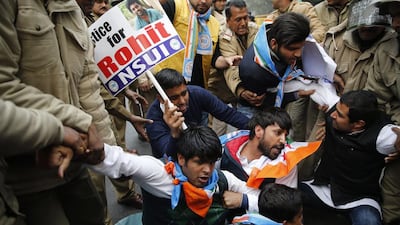NEW DELHI // The suicide of a young research scholar at Hyderabad Central University has sparked protests over the deep caste stratification in India’s universities, with hundreds of students calling for top officials to resign on Tuesday.
Rohith Vemula, 26, a PhD student in life sciences, hanged himself in a hostel room on Sunday. His death came more than two weeks after he and four other Dalit — or “untouchable” caste — students were suspended by the university for engaging in “antinational politics”.
The suicide has highlighted the isolation and discrimination that Dalit students frequently face in universities.
Over the past four years, 18 Dalit university students have killed themselves "rather than continue to battle on in these dens of caste prejudice and social exclusion", an editorial in The Hindu newspaper noted on Tuesday.
Vemula left behind a five-page suicide note, insisting that taking his life was his own decision.
“No one is responsible for ... this act ... No one has instigated me, whether by their acts or their words.”
He called “life itself [a] curse” and hinted at the difficulties of being born into a low caste: “My birth is my fatal accident.”
Demonstrations in Hyderabad continued for a second day on Tuesday, drawing nationwide attention as TV channels ran updates throughout the morning.
“We want justice,” shouted students who boycotted classes, as scores of police stood by. Eight students were detained overnight on Tuesday.
In Delhi on Monday, more than 100 students protested Vemula’s suicide outside the ministry of human resource development, which administers education in India.
Police used water cannons to disperse the protesters, who called on the minister of human resource development, Smriti Irani, to probe the events leading up to Vemula’s death.
“The government has no role to play” in regulating the internal affairs of universities, Ms Irani said. Nevertheless, a two-member fact-finding team from the ministry left for Hyderabad the same day.
Mr Vemula’s fellow students, meanwhile, claim that responsibility lies with the university vice-chancellor, P Appa Rao, and the junior labour minister in the federal government, Bandaru Dattatreya. The Hyderabad police have opened investigations into whether both officials can be charged with abetment of suicide.
Last August, Mr Dattatreya — a parliamentarian from Hyderabad — had written to Ms Irani, demanding punitive action against the five Dalit students belonging to the Ambedkar Students Association (ASA).
The ASA — named after BR Ambedkar, a freedom fighter and a champion of Dalits — engaged Dalit students in political discussions of caste
The five ASA students had participated in a protest against the death penalty in July, just before convicted terrorist Yakub Memon was hanged. The protests, Mr Dattatreya wrote, showed how the university “has … become a den of casteist, extremist and antinational politics”.
Following the complaint, the university stopped paying out fellowship funding to the five students. In September, they were suspended, and their appeal was rejected in late December. Forced to move out of their hostels, the students lived in a tent on campus, where they began a hunger strike.
Mr Dattatreya denied any involvement in the suicide.
“I have not been named in the suicide note. I have nothing to do with it,” he said. “I just received a petition about activities in the [university] which I forwarded to the [ministry]. I have no role in this episode.”
Behind the immediate controversy of the expulsions, however, lies the deeper and uglier picture of how upper-caste students and professors frequently discriminate against Dalit university students, said AR Venkatachalapathy, a social historian at the Madras Institute of Development Studies.
Even the brightest Dalit students struggle once they reach university, perhaps due to unfamiliarity with English or their struggles to fit into the wider student body.
“It is particularly bad in the sciences, where faculties and student bodies rarely have any Dalit students,” Mr Venkatachalapathy said. “In the social science departments, at least, there is some awareness of caste dynamics. In the sciences, the first response is: ‘Why are these students even here?’ “
In many universities, he added, Dalit students simply take the discrimination lying down. But in some, such as Hyderabad Central University, Dalit student groups have become more assertive.
“Inevitably, it is in these universities that such suicides happen, universities where Dalits have become politically sensitised and have clashed with other groups,” Mr Venkatachalapathy said. The signs of such despair have also been visible elsewhere in the country.
In 2012, Anil Kumar Meena, a Dalit student at the All India Institute of Medical Sciences — the country’s top medical college — hanged himself. Media reports revealed that he had struggled to cope with classes in English and that he had found little support from faculty members.
Senthil Kumar, another Dalit student at Hyderabad Central University, killed himself in 2008. His friends said he was often harassed in classrooms because of his caste, and that no faculty members made themselves available to guide Dalit students.
Vemula himself, in a caustic letter to the vice-chancellor Mr Appa Rao that was dated last December, indicated that suicide was a recourse for desperate Dalit students.
“Supply a nice rope to the rooms of all Dalit students,” Vemula had suggested. “We here are left with no easy exit, it seems. Hence, I request your highness to make preparations for the facility ‘EUTHANASIA’ for students like me. And I wish you and the campus rest in peace forever.”
ssubramanian@thenational.ae
* with additional reporting from Associated Press

